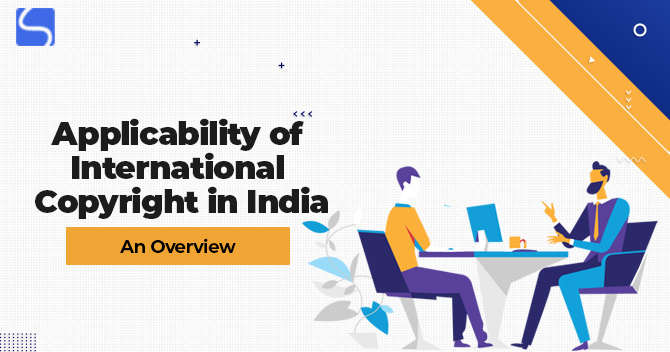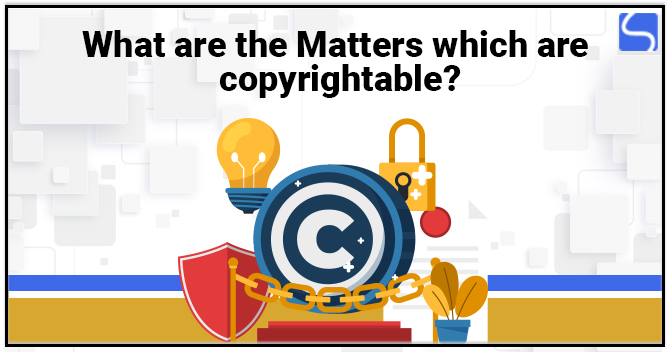Applicability of International Copyright in India – An Overview

Karan Singh | Updated: Apr 27, 2021 | Category: Copyright
After the independence, the Copyright Act, 1957 was the first Copyright Law in India. But, this law has been altered six times since 1957. The latest alteration was in the year 2012, through the Copyright (Amendment) Act, 2012.
India is a member of the most prominent International Copyright convention leading the part of Copyright law, counting the following:
- The Universal Copyright Convention, 1951;
- The TRIPS Agreement (Trade-Related Aspects of Intellectual Property Rights);
- The Berne Convention, 1886[1] (altered in 1971 at Paris);
- Before, Indian was not a part of the WCT or WIPO Copyright Treaty and WPPT (WIPO Performance and Phonograms Treaty) but subsequently entered the Treaty in the year 2013.
Table of Contents
What is an International Copyright?
International Copyright protects an author or creator’s creativity or writings across the globe. The protection is given against unauthorized usage in a specific nation, depending on the nation’s law. Many nations offer protection to overseas works under some circumstances, which have been greatly simplified by Global Copyright Treaties & Conventions. In 1999, the International Copyright Order was developed to safeguard the owners or authors of the overseas Copyright works and put in force protections beyond the national limits.
Examination of International Copyright under Indian Law
Under the Indian Law, the Copyright of work of the different nations mentioned in the International Copyright Order is safeguarded in India, as if such works are Indian works. The advantages granted to overseas works must not broaden beyond what is available to the works in the home country and only on a joint basis that is the overseas nation should grant the same protection to works allowed to Copyright under the Copyright Act. In exacting, the application for Copyright Registration found on examining the application that the work submitted for registration under the Copyright Act, 1957 was already registered in the USA. Therefore, an inconsistency was raised.
The Learned Copyright Registrar observed that “As per the provisions of Section 40 of the Copyright Act, 1957, read with International Copyright Order, 1999, states that the Copyright of nationals of countries who are the members of the Berne Convention of the Protection of Artistic and Literary Works are safeguarded in India. A list of such nations is made obtainable in Part 1 of the Schedule set out under the International Copyright Order 1999”. Moreover, the Learned Copyright Registrar agreed that an applicant desires so; they may also look for the Copyright Registration of their works in India by complying with the Act and Copyright Rules necessities 2013.
What is the Importance of International/Global Copyright?
The purpose of the Copyright Treaties, conventions, or Agreements is to focus on the principle that the genuine or unique creativity or works of the mind, which is the subject matter of protection under the law, must be distributed and circulated regardless of their countrywide borders. Following are some simple principles of the vital Copyright Conventions:

Principle of Automatic Protection
The meaning of this principle is that such national treatment shall not be depending on any formalities, which means protection or security should not be provisional upon compliance with any courtesy.
Principle of National Treatment
The works arise in one of the Contracting States (author’s work 1st published in such a State or author works in such a State) should be given the same safety in each of the other Contracting States as the latter grants to the works of its nationals.
Principle of Independence Protection
It simply means that the use and the enjoyment of the rights in a safeguarded work in a particular nation are independent of the non-existence or existence of protection in the country of origin or any other nation.
What are the Different International Conventions or Treaties?
The global/ international treaties or conventions promote consistent Copyright protection from nation to nation. They set minimum standards of security, which each participant nation then execute within the limits of its Copyright Law. You can check different International Conventions or Treaties below:
1.Berne Convention: The Berne Convention was acquired in the year 1886 to safeguard actual, original, or unique works and the lawful rights of their creators or authors. It defends creators such as painters, artists, authors, poets, musicians, etc. With the means to control how their actual works are used, by whom and on what conditions. The establishment of this convention was based on three basic principles. This includes a sequence of provisions determining minimum security to be granted and special provisions in each other contracting nations, and the following are the three basic principles:
- Protection is not provisional or depends upon fulfilment with any official procedure, and instead, it is automatic;
- Copyright Protection should be independent, and the existence of Copyright protection in a nation of origin of the work. But, if a contracting nation delivers for a longer time of protection than the minimum prescribed time by the convention and the work ceases to be safeguarded in the nation of origin, protection may be denied once protection in the nation of origin ends;
- The works developing in one of the contracting nations should be given similar Copyright protection in each of other contraction nations.
Prior to the Berne Convention, there was very minimal protection for creators outside their home country. This convention safeguards the Artistic and Literary works in an International Copyright Agreement that covers a creator work after the publication or produced outside the home country. It defends their right to authorize adaptations, translations, broadcasts, reproduction, performances, or another way of communication of their work.
2. Trade-Related Aspects of Intellectual Property Rights (TRIPS): Following are some crucial features of TRIPS:
- TRIPS was signed in the year 1996;
- TRIPS is managed by the World Trade Organization (WTO);
- It consists of the number of provisions concerning the enforcement of Intellectual Property Rights;
- It also tells that the national laws have to make the efficient enforcement of Intellectual Property rights possible and describe how execution must be addressed in detail.
3. Universal Copyright Convention: It covers the creator’s work that is a national or domiciliary of the nation, that is a member of such conventions or treaties or the actual works published in a member nation or published within thirty days of 1st publication in a Berne Union nation may claim Copyright protection under them. Under this convention, any formalities in national law should be satisfied by using the Copyright notice in the form and position mentioned in the Universal Copyright Convention.
The notice of the Universal Copyright Convention must contain the (c) symbol accompanied by a year of its 1st publication and the name of the Copyright owner. Such notice has to be placed in such a manner to give sensible information of the claim to Copyright.
4. WIPO Copyright Treaty:
- It was signed in 1996;
- It classified as Copyright Infringements;
- This Treaty also clears that the computer programs and databases are safeguarded under Copyright Law;
- The elimination from the work of implanted rights management information;
- It acknowledges that the broadcast of works over the internet and same networks are an exclusive right within the Copyright scope, formerly held by the author or creator;
- The circumvention of technologies security determines it attached to works.
5. Rome Convention:
- Performers such as dancers, musicians, actors, and those who perform artistic or literary works are safeguarded against individual acts to which they have not approved, such as communication to the public of a live performance;
- Broadcasting organizations have the right to allow or exclude certain acts, namely the rebroadcasting of their broadcasts, the fascination of their broadcasts and the reproduction of such desires;
- Phonogram producers have the right to allow and exclude the indirect or direct reproduction of their phonograms. In this convention, phonograms mean any auditory fixation of sounds of a performance or other sounds.
Remedies under International Copyright Order
The overseas works are considered under the International Copyright Order, 1999, are safeguarded under the Act; the provisions concerning enforcing the rights under the Copyright Act are also accessible to the overseas Copyright owners.
This order broadens its protection under the Copyright Act to overseas works. Hence, both the civil remedies and criminal remedies for Copyright Infringement under Chapter XII and XIII are available to foreign works. In India, the Copyright Act delivers dual legal machinery to the correct owners for enforcing the rights. This enforcement is possible by:
- The Courts;
- The Intellectual Property Appellate Board.
The Copyright Act was introduced with a quasi-judicial body known as the Copyright Board, which is now combined with IPAB (Intellectual Property Appellate Board) as per the Finance Act, 2017, which came into action from April 01, 2017. The Board is assigned to arbitrate disputes relating to Copyright Registration, Copyright Assignment, and issuance of licenses regarding the works withheld from the public, production, unpublished Indian works, and publication of translations. Moreover, it hears cases in other varied matters initiated before it under the Copyright Act.
As per Section 62 of the Copyright Act, the District Courts have authority in a matter related to the violation of any right conferred by the Act or concerning infringement in any other work. But, an appeal against an IPAB order can be preferred prior to the High Court has control.
Conclusion
A creator who desires to have Copyright protection for their original and unique work in a specific nation should first find out the level of security available to the foreign authors or creators’ works in that particular country. If possible, this must be done before the publication of work anywhere because Copyright protection may be based upon the facts presented during the first publication.
Read our article:Why is Copyright Registration Required in India?














